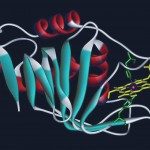Link to Pubmed [PMID] – 10734082
J. Biol. Chem. 2000 Mar;275(13):9385-9
The transcription factor Sp1 regulates the activity of a large number of eukaryotic gene promoters, including early SV40 and human immunodeficiency virus type 1 (HIV-1). Here, we report that expression of SV40 small tumor antigen (small t) in quiescent CV-1 cells transactivates two Sp1-responsive promoters, including a deletion mutant of HIV-1 LTR, through specific inhibition of endogenous AC and ABalphaC forms of protein phosphatase 2A (PP2A). Expression of a small t mutant, lacking the PP2A-binding domain, failed to transactivate Sp1. Overexpression of the B56alpha, B56beta, and B56gamma1 regulatory PP2A subunits strongly inhibited the ability of small t, but not the phosphatase inhibitor, okadaic acid, to enhance Sp1-driven gene expression. Using inhibitors and co-expression of kinase-deficient mutants, we also show that functional phosphatidylinositol 3-kinase (PI 3-kinase) and atypical protein kinase C zeta are required for small t-induced Sp1-dependent promoter transcriptional activation. Moreover, two inhibitors of PI 3-kinase, wortmannin and LY294002, inhibit the initiation of SV40 DNA replication in quiescent CV-1 cells. Taken together, these results suggest that PP2A and PI 3-kinase contribute to the ability of small t to regulate Sp1 activity, stimulate early SV40 DNA replication, and enhance the transformation of resting cells during SV40 infection.
